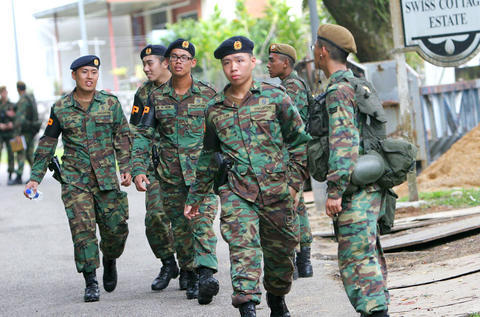Singapore, which prides itself on rigorous anti-terrorist measures, yesterday blamed a security lapse for the escape of an alleged leader of the Jemaah Islamiyah (JI) militant network.
Authorities mounted a massive manhunt as analysts said Mas Selamat bin Kastari, accused of planning to hijack a plane and crash it into Changi Airport, would try to flee to Indonesia.
"This should never have happened. I'm sorry that it has," Home Affairs Minister Wong Kan Seng (

PHOTO: EPA
Rohan Gunaratna, head of the International Center for Political Violence and Terrorism Research, said Kastari had escaped once when he was in Indonesia, but his flight from the Singapore facility was unexpected.
"I think that it has surprised the Singapore authorities and everyone because Singapore's security systems are world-class," he said.
The ministry said Kastari walks with a limp and was not known to be armed.
It said he escaped on Wednesday afternoon from the Whitley Road Detention Center, which holds prisoners detained by the Internal Security Department.
Wong said Kastari had been taken from his cell to the family visit room to await his family.
"He asked to go to the toilet, where he escaped," Wong said.
The minister was responding to a member of parliament who said the escape "raised concerns about our police force vigilance and security operating procedures."
Wong said security had been tightened at all air, sea and land checkpoints and no effort would be spared to locate Kastari, who analysts say received military training in Afghanistan.
Soldiers, Special Operations police and paramilitary Nepalese Gurkhas had joined the manhunt.
Clive Williams, a professor with the Australian Defence Force Academy, predicted Kastari would try to reach Indonesia, "because if he stays in Singapore he's going to be arrested fairly quickly I would think."
Kastari, born in 1961, was arrested on the Indonesian island of Bintan near Singapore in 2003 and sentenced by a court there to 18 months in jail.
He was later released but arrested again by Indonesian authorities in January 2006 before being handed over to Singapore.
Kastari had fled Singapore in December 2001 following an Internal Security Department operation against JI, the Home Affairs ministry said previously.
"He was among those who had planned retaliation against Singapore for arresting and detaining his fellow JI members. He had planned to hijack a plane and crash it into Changi Airport," the ministry said.
Singapore authorities arrested 15 people in December 2001 -- 13 of whom were suspected JI members -- who allegedly planned to attack a bus carrying Americans to a subway station.
Businesses, offices and schools operated normally despite the massive security presence.
Wong said security agencies had concluded there was "no imminent danger" to the public after Kastari's escape.
He said an independent investigation was being conducted into the incident.

VAGUE: The criteria of the amnesty remain unclear, but it would cover political violence from 1999 to today, and those convicted of murder or drug trafficking would not qualify Venezuelan Acting President Delcy Rodriguez on Friday announced an amnesty bill that could lead to the release of hundreds of prisoners, including opposition leaders, journalists and human rights activists detained for political reasons. The measure had long been sought by the US-backed opposition. It is the latest concession Rodriguez has made since taking the reins of the country on Jan. 3 after the brazen seizure of then-Venezuelan president Nicolas Maduro. Rodriguez told a gathering of justices, magistrates, ministers, military brass and other government leaders that the ruling party-controlled Venezuelan National Assembly would take up the bill with urgency. Rodriguez also announced the shutdown

Civil society leaders and members of a left-wing coalition yesterday filed impeachment complaints against Philippine Vice President Sara Duterte, restarting a process sidelined by the Supreme Court last year. Both cases accuse Duterte of misusing public funds during her term as education secretary, while one revives allegations that she threatened to assassinate former ally Philippine President Ferdinand Marcos Jr. The filings come on the same day that a committee in the House of Representatives was to begin hearings into impeachment complaints against Marcos, accused of corruption tied to a spiraling scandal over bogus flood control projects. Under the constitution, an impeachment by the

Exiled Tibetans began a unique global election yesterday for a government representing a homeland many have never seen, as part of a democratic exercise voters say carries great weight. From red-robed Buddhist monks in the snowy Himalayas, to political exiles in megacities across South Asia, to refugees in Australia, Europe and North America, voting takes place in 27 countries — but not China. “Elections ... show that the struggle for Tibet’s freedom and independence continues from generation to generation,” said candidate Gyaltsen Chokye, 33, who is based in the Indian hill-town of Dharamsala, headquarters of the government-in-exile, the Central Tibetan Administration (CTA). It

A Virginia man having an affair with the family’s Brazilian au pair on Monday was found guilty of murdering his wife and another man that prosecutors say was lured to the house as a fall guy. Brendan Banfield, a former Internal Revenue Service law enforcement officer, told police he came across Joseph Ryan attacking his wife, Christine Banfield, with a knife on the morning of Feb. 24, 2023. He shot Ryan and then Juliana Magalhaes, the au pair, shot him, too, but officials argued in court that the story was too good to be true, telling jurors that Brendan Banfield set